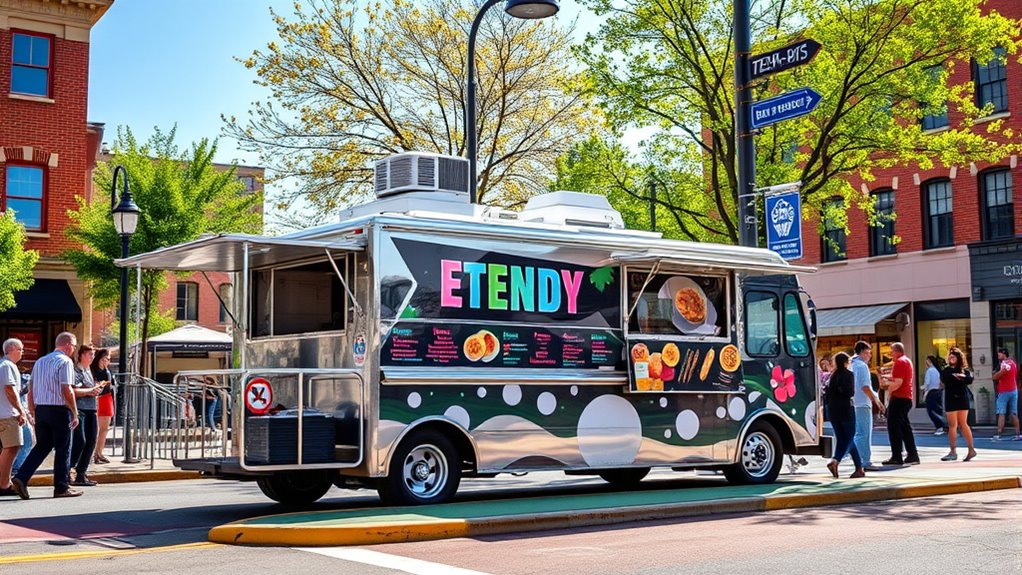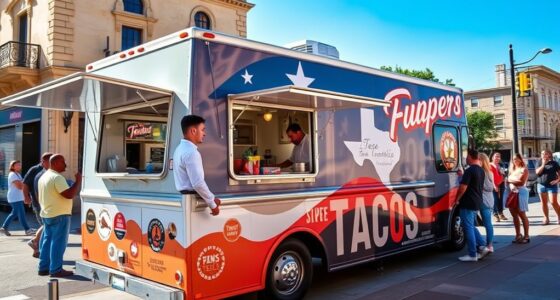To open a food truck in Bethesda, Maryland, you need to secure permits like a Mobile Food Service Facility Permit, Food Truck License, and possibly a Vendor’s Permit if vending in parks. Expect startup costs between $75,000 and $200,000, plus monthly expenses for fuel, staff, and supplies. Find busy locations such as shopping centers, schools, or events. Plan your menu to meet health standards, and use social media and events to attract customers. Continue to learn how to make your food truck business thrive.
Key Takeaways
- Obtain necessary permits including health, mobile food, vendor, and fire safety approvals from Montgomery County authorities.
- Budget $75,000–$200,000 for a new truck, plus monthly costs for fuel, maintenance, staff wages, and insurance.
- Secure prime locations with high foot traffic like Westbard Square, near schools, transit stops, and event venues.
- Develop a compliant menu with quick, safe-to-prepare items, approved by the health department, sourcing ingredients from licensed vendors.
- Use social media, participate in local events, and implement loyalty programs to boost visibility and customer retention.
Navigating Permits and Licenses in Bethesda
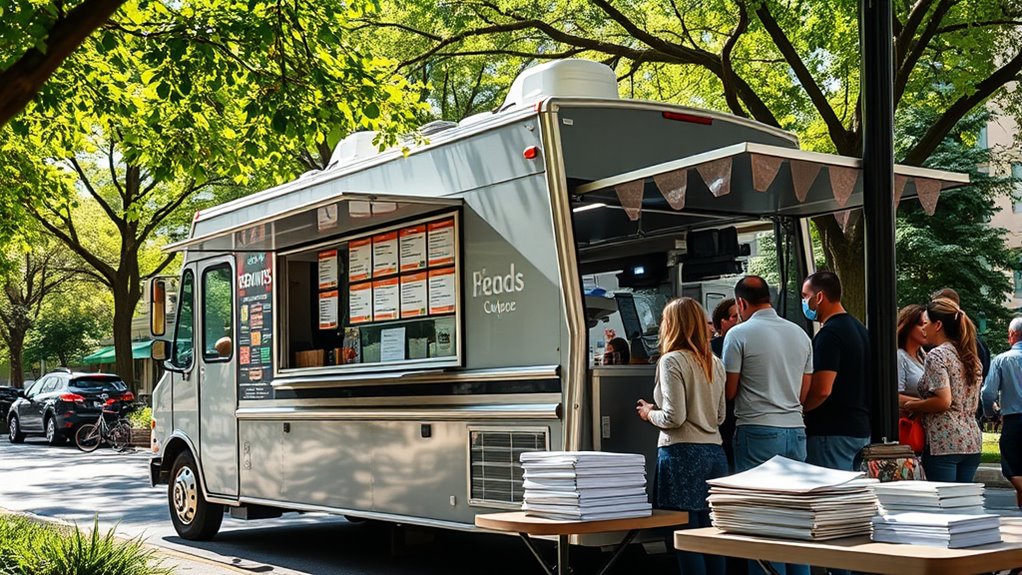
Starting a food truck in Bethesda requires maneuvering a series of permits and licenses to operate legally and safely. You’ll need to complete a plans review, ensuring your truck meets health and safety standards, which involves submitting documents and scheduling inspections. A Mobile Food Service Facility Permit is mandatory; you must register with the local Department of Health, providing details about your truck and commissary. You’ll also need a Food Truck License, displayed prominently on your vehicle, approved for each area you plan to serve, including private or public land. If vending in parks, a Vendor’s Permit from Montgomery Parks is necessary, along with proof of liability insurance and other state permits. Additional approvals, such as fire, zoning, and vehicle registrations, may also be required. Ensuring compliance with health regulations can help prevent potential nutrient deficiencies and other issues related to food safety.
Understanding the Costs Involved in Food Truck Operations
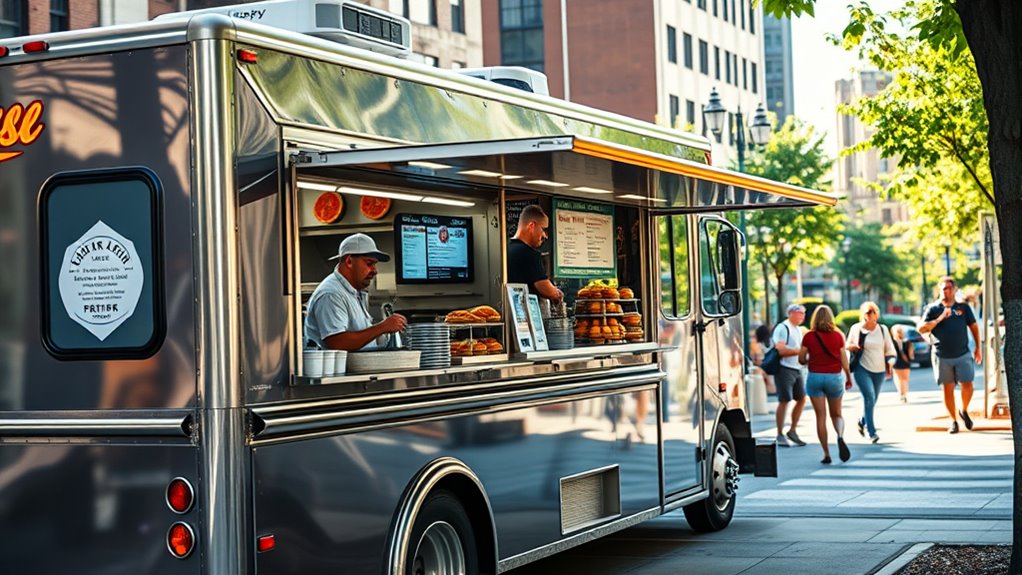
Understanding the costs involved in operating a food truck is essential for budgeting and ensuring your business remains profitable. Your initial investment can vary widely depending on whether you buy new, used, or rent. For example:
- Purchasing a new truck costs between $75,000 and $200,000, while used trucks can be as low as $50,000 to $100,000. Used trucks, in particular, can offer significant savings but may require additional maintenance or upgrades. Additionally, considering the health and safety regulations is crucial to ensure compliance and avoid penalties.
- Monthly expenses include fuel and maintenance, which can range from $300 to $1,000, plus costs for generator and vehicle repairs.
- Labor costs for 2 to 4 staff members typically fall between $6,000 and $12,000 monthly, depending on wages and hours.
Additional costs like insurance, marketing, and supplies also add up, so plan carefully to keep your business financially healthy.
Identifying Prime Locations for Your Food Truck Business
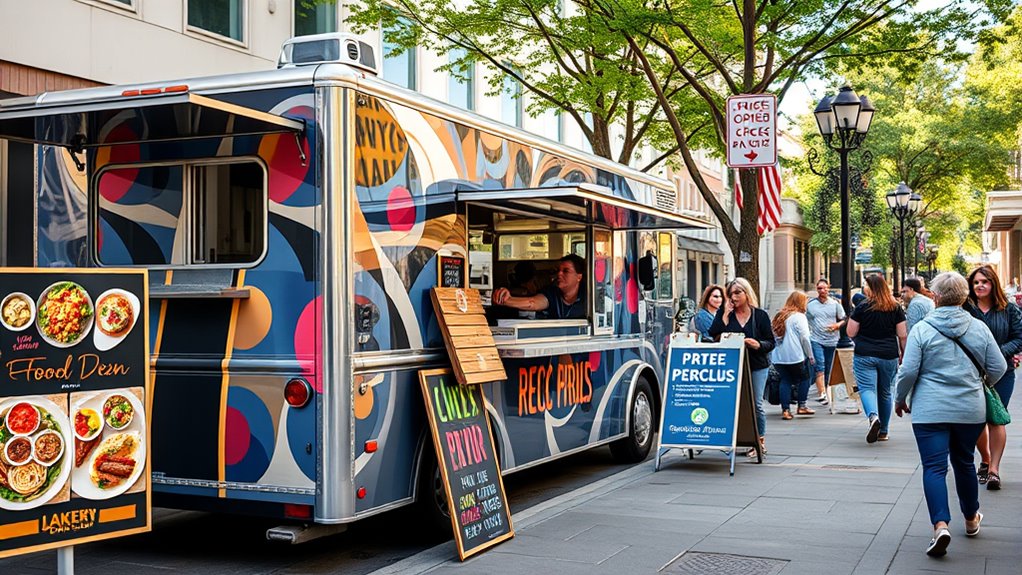
Choosing the right location can make or break your food truck’s success in Bethesda. Focus on high foot traffic areas like shopping centers such as Westbard Square, where diverse customers visit regularly. Position near schools or universities, like Whitman, for steady daytime sales from students seeking quick, affordable meals. Public transit stops boost visibility and accessibility for commuters, while events and festivals attract concentrated crowds perfect for temporary spots. Consider areas with nightlife or bars to increase evening sales. Leverage established food truck hotspots and platforms like Moco Food Trucks to connect with a built-in audience. Guarantee locations have ample parking, utilities, and easy entry and exit. Target neighborhoods with high daytime populations and diverse demographics to maximize your truck’s exposure and sales. Ensuring your location complies with permitting requirements can prevent legal issues and help maintain smooth operations.
Crafting a Compliant and Appealing Menu
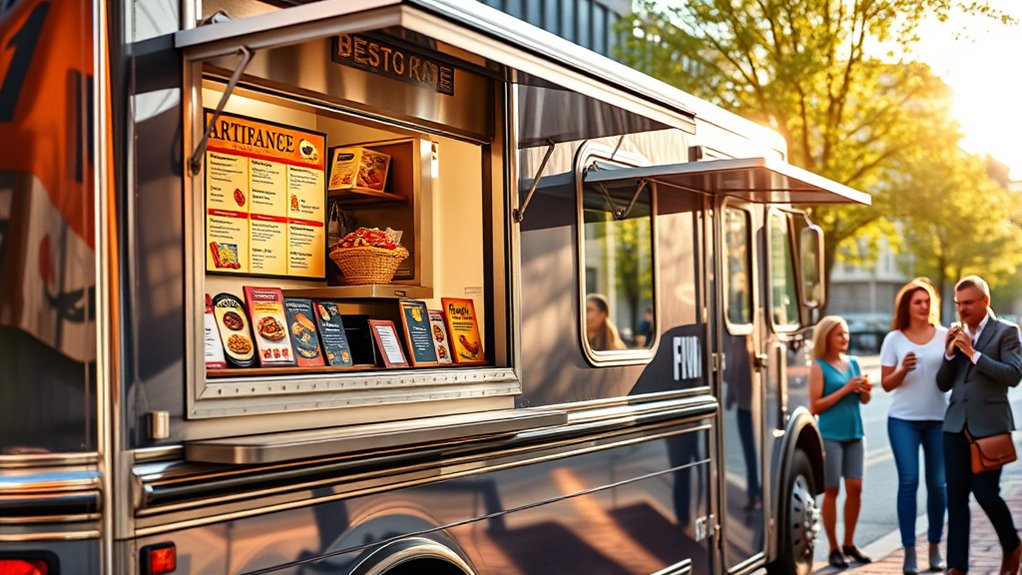
Crafting a compliant and appealing menu for your Bethesda food truck requires careful planning to meet local health regulations and attract customers. First, submit a proposed menu for approval by the health department, ensuring it aligns with your operational plan. Second, choose items that are quick to prepare or pre-made, considering limited space and equipment. Third, focus on ingredients sourced from approved vendors, keeping receipts for up to 90 days for inspection. Your menu must also comply with Maryland and Montgomery County health codes, avoiding complex dishes that increase contamination risks. Include items that can be maintained at safe temperatures and easily stored. Additionally, plan for manageable perishability, enabling high turnover and cost control while offering popular, seasonal options tailored to local demand. To ensure compliance and efficiency, familiarize yourself with food safety regulations and best practices. Food truck zones are being considered by Montgomery County to facilitate operations and reduce conflicts with brick-and-mortar restaurants.
Effective Marketing Strategies to Grow Your Food Truck Business
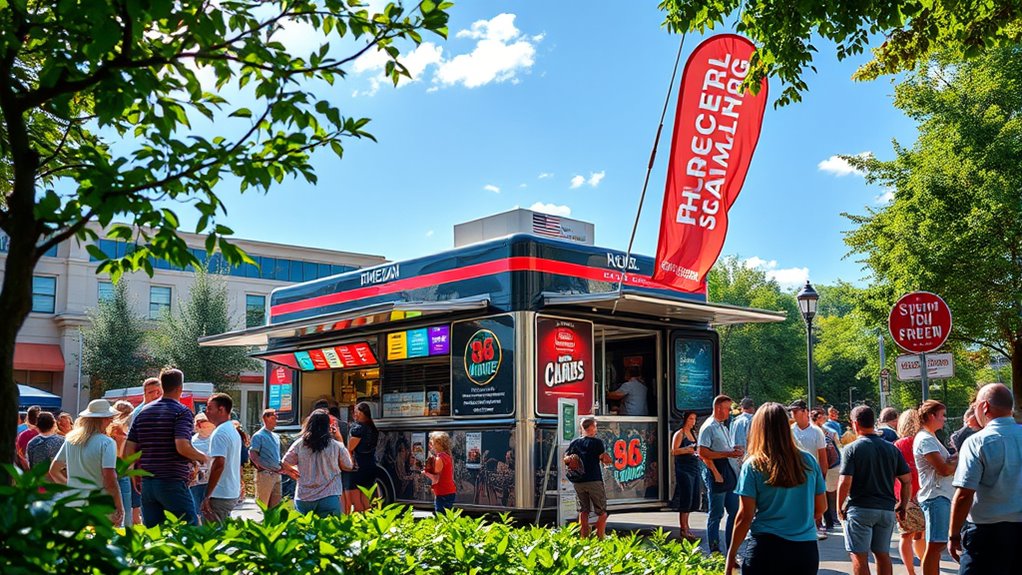
Utilizing effective marketing strategies is essential for growing your Bethesda food truck business and standing out in a competitive market. Leveraging social media is key; 68% of food trucks use it regularly, with Facebook being the most popular (75%). Social campaigns increase sales by 20%, and nearly 40% of customers discover trucks through social ads. Active engagement encourages customers to spend about 15% more per visit. Building a dedicated email list (used by 60%) enhances direct communication. Participating in local events boosts brand presence—80% of trucks attend at least three annually. Loyalty programs, adopted by over half, lead to 30% more repeat visits. Ultimately, mobile apps and GPS tracking improve customer access and satisfaction, making your marketing efforts more effective. Incorporating Free Floating concepts into your outreach can further enhance your visibility and appeal in the community.
Frequently Asked Questions
What Are the Specific Health and Safety Requirements for Food Trucks in Bethesda?
You need to guarantee your food truck meets health and safety standards by installing a fire suppression system, mechanical ventilation hoods, and portable fire extinguishers rated for grease fires. Follow strict food safety procedures, source from approved vendors, and keep an HACCP plan onboard. Maintain proper water supply, waste disposal, and sanitation routines. Display current licenses, work with a licensed commissary, and comply with county inspections to operate legally and safely.
Are There Any Restrictions on the Types of Cuisine Allowed in Bethesda Food Trucks?
You might wonder if Bethesda restricts specific cuisines for food trucks. Currently, there are no rules limiting cuisine types, so you’re free to serve whatever you like. The main focus is on health and safety standards, ensuring your menu complies with permit requirements. As long as your food preparation meets safety protocols, you can offer diverse cuisines without worrying about restrictions, making it open for your creative menu ideas.
How Do I Renew My Food Truck Permits and Licenses Annually?
Renewing your food truck permits is like tending to a garden—you need to stay consistent. You’ll submit a renewal application to Montgomery County, including updated menus, proof of vehicle registration, and health compliance documents. Pay the renewal fee, schedule a pre-operation inspection, and guarantee your commissary meets standards. Do this before your license expires to keep your operation smooth and avoid any hiccups in your food truck journey.
Can I Operate My Food Truck at Private Events or Festivals in Bethesda?
You can operate your food truck at private events or festivals in Bethesda, but you need proper licensing and permissions first. Make certain you have a mobile food service license, pass health inspections, and use a licensed commissary. Get event-specific permits from organizers, and comply with operating hours and location rules. Always display your license, carry proof of insurance, and coordinate logistics with event staff to ensure a smooth setup and operation.
What Insurance Coverage Is Recommended for Food Truck Businesses in Maryland?
Think of your food truck business as a ship steering unpredictable waters. To stay afloat, you need a sturdy life raft—insurance coverage. Maryland recommends general liability to protect against customer injuries, commercial auto for vehicle risks, and product liability for food safety. If you have staff, workers’ comp is essential. Bundling these policies ensures you’re prepared for storms and keeps your business sailing smoothly across all Maryland locations.
Conclusion
Starting your food truck journey in Bethesda is like planting a seed—prepare the soil with permits, nurture it with a compelling menu, and water it with strategic marketing. With patience and dedication, your truck can bloom amidst the vibrant cityscape. Remember, each step you take is a drop of water that helps your business grow. Stay committed, and watch your passion become a flourishing symbol of your success.
